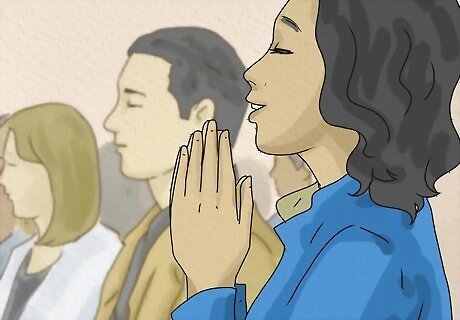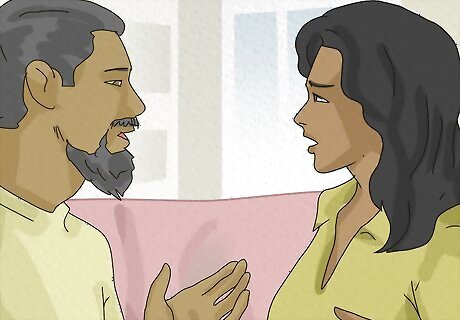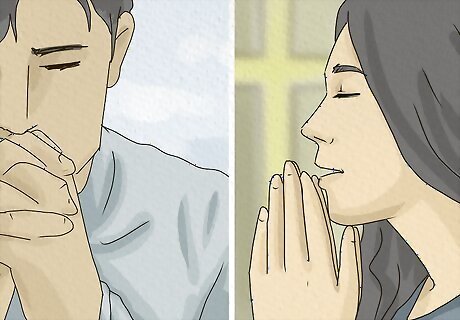
views
- If you’re equally yoked with your partner, it means you have the same morals and spiritual values (regardless of your religious upbringing).
- You and your partner are probably equally yoked if you worship the same higher power, have similar goals, and know how to communicate effectively.
- While the term ‘equally yoked’ originated in Christianity, it can be applied to all types of spirituality. Plus, being ‘equally yoked’ looks different for every couple!
What does “equally yoked” mean?

Being equally yoked means sharing the same spiritual values. The term comes from the Bible. 2 Corinthians 6:14 states “Do not be unequally yoked with unbelievers. For what partnership has righteousness with lawlessness?” This implies that romantic pairs who don’t share the same spiritual set of beliefs are “unequally yoked” and unfit to last. To be “equally yoked” with your partner is the opposite. If you’re equally yoked, you two share the same set of morals and likely worship the same higher power, which means you’re more suited for a lasting marriage. Usually, “equally yoked” means following the same religion. However, you can be “equally yoked” with someone of a different faith, as long as you both support each other’s beliefs and have a similar spiritual purpose. Because of its Christian etymology, “equally yoked” is a term most often used by Christians. However, it can apply to any religion (and even non-religious spiritual people).
Why Being Equally Yoked is Important

It allows you to build your relationship with your higher power. When you and your partner are equally yoked, you support the spiritual beings that govern each other’s lives (whether that’s Christ, Buddha, or something else entirely). Having a partner who unconditionally endorses your relationship with your God allows you to continue to build a meaningful relationship with your higher power, which leads to more spiritual fulfillment. Being equally yoked with someone of a similar but different faith also allows you to re-assess your connection to your higher power. This can deepen the spiritual relationship. There’s also a chance you may be able to help your partner develop their own relationship with your higher power, which in several faiths, is a sacred gesture.

You can be your truest and best self. Your relationship can’t flourish if you’re not your most authentic you. While all partnerships require compromise, you should feel comfortable expressing your faith freely, without restrictions. If you and your partner are equally yoked, you can share your ideas about a higher power and the afterlife without having to adjust to make the other feel comfortable. This authenticity will strengthen your intimacy and affection.

You can raise children with consistent beliefs. If you and your partner decide to raise kids, it’s important to be in agreement about what you teach them, how you discipline them, and how spiritual you decide to make your household. By having a partner who’s equally yoked, your kids can grow up with the same ideologies. This will make it easier to: achieve family unity, maintain faith throughout your home, and help them become well-rounded adults. In addition, raising kids with a strong spiritual set of beliefs has been shown to improve their mental health.

You can walk the same life path with your partner. A “life path” refers to your passions and spiritual mission throughout your life. By being equally yoked with your partner, you’ll have similar spiritual purposes, which will make it easier for you to help manifest those goals. Plus, a shared mission can bring you two closer together. Your mission can be active, like volunteering or becoming missionaries together, theoretical like enhancing your knowledge of your religion’s texts and history, or emotional like trying to live a meaningful life and being kind to others.
Signs You’re Equally Yoked

You both have your own relationships with your higher powers. For a healthy, equally yoked relationship, you both have to be committed to faith and spirituality, regardless of what your partner thinks. If you each spend time throughout your week praying and increasing your spiritual knowledge alone and as a couple, you’re much more likely to be equally yoked. To develop a closer relationship with your higher power, set aside a few minutes a day and have a conversation with your deity. Talk about your feelings: your hopes, fears, and joys. Remember: God doesn’t judge so don’t worry about saying the wrong thing. You can also get in touch with your spiritual side by connecting with nature and/or art, and asking yourself major questions like: What is my connection to the world around me? Do things happen for a reason? How can I live my life in the best way possible?

You’re committed to learning and following each other’s religions. Some people believe that to be equally yoked, you have to worship the same God. This depends on how intensely you follow your faith and which faith you follow. However, as long as you and your partner respect each other’s faiths and are willing to cultivate a household that celebrates both religions, you can usually be equally yoked as an interfaith household. Everybody has different rules for how they accept other faiths. For example, you may be more than willing to read from a different religious text while your partner may see that as worship of a false god. Have a conversation and discuss your boundaries.

You have similar goals. If you and your partner share the same overall mission in life, you’re more likely to last and it becomes much easier to work through smaller, day-to-day conflicts. In addition, odds are, if you have the same priorities (spreading kindness, practicing self-care, letting go of vices), you can find common ground spiritually, which means you’re equally yoked. Examples of similar goals include: how you think money should be spent, having children and what principles you want to teach them, where you want to live, and political affiliations.

You’re both willing to compromise. All healthy relationships require a willingness to sacrifice and meet each other halfway. If you and your partner can set aside your pride and prioritize making each other feel respected, while still conveying your emotional needs, you have similar levels of emotional maturity (which is a major sign you’re equally yoked). One easy way to get better at compromising is to remain solution-focused. Whenever you get into an argument, ask yourself “what are we trying to get out of this?” If you can determine what both of your goals are, you can find an option that fits both of your needs.

You communicate effectively and can work through conflict. Being able to effectively communicate is key to building a faithful and meaningful romantic partnership. By conveying your ideas thoughtfully and respectfully, you enhance your relationship and your ability to connect spiritually with one another, which makes it easier to be equally yoked. Two core principles of communication are actively listening and forgiveness. Instead of merely waiting for your turn to speak, fully hear your partner out and clarify you understand their feelings. In addition, if you’re frustrated with them, try to let go and focus on improving in the future, rather than dwelling on the past. A lot of religious texts support the principles of communication. For example, Judaism endorses shema: listening and understanding. In Christianity, James 1:19 states “everyone should be quick to listen, slow to speak and slow to become angry.”
What to Do if You’re Unequally Yoked

Seek out a mentor to help you find common ground. If you and your partner are unequally yoked (you can’t communicate, and your spiritual beliefs diverge too much), consider finding a neutral, spiritual party you both trust to help you compromise and work through your disagreements in a healthy way. Attending couples counseling is a great place to start. In addition, it can help finding your own individual spiritual mentors (ministers, rabbis, etc.) to help serve as sounding boards, so you can voice your struggles without hurting your partner.

Pray for each other and be respectful. Pray for each other’s spiritual growth. Pray for guidance from a higher power. Pray together to help find common ground. Once you’re done praying, let the spiritual dilemmas go and be present. Remain open to discussion, but never discredit or mock each other’s beliefs. Prayer is a loving act, which demonstrates to your partner that, despite your differences, you’re fully invested in their well-being. Plus, it builds your spiritual muscles which can make you more empathetic and equipped to handle the struggles that come with being unequally yoked.

Have patience and maintain independence. Becoming equally yoked takes time. Recognize this and give your partner the space they need to get in touch with their spiritual self. Lead by example. Continue practicing your faith on your own schedule, but allow your partner to come to you.

Know when to walk away. If you and your partner’s faith (or lack thereof) continues to be an issue, and you’ve tried to work through it, but nothing seems to work, it may be time to let go and find someone whose spiritual beliefs are closer to yours. While you can totally be friends with non-believers and people you disagree with, relationships require more connection and intimacy. If you decide to end things with your partner, do so in person and make it clear it’s not their personality or beliefs that are the issue; it’s the fact that their beliefs don’t align with yours. For example, instead of “you don’t believe in Christ’s power so we have to break up” (which sounds blamey and puts all the responsibility on them), you might say “You’re fun and kind, but Christ will always be my number 1. Since he’s not yours, I don’t think this relationship can continue.

Accept that equally yoked relationships look different for everyone. There’s a lot of debate over what makes an equally or unequally yoked partnership. Some Christians insist that, if one partner doesn’t believe in Jesus, the relationship will always be unequally yoked. Others believe that you can be equally yoked if you have the same morals, regardless of how often you go to church. Don’t worry about others’ opinions. Decide what works for you and work through your relationship accordingly. Dyadic psychology even argues that two people can be equally yoked, even if they’re both entirely secular. All that matters is they support each other’s identities and overall beliefs.




















Comments
0 comment